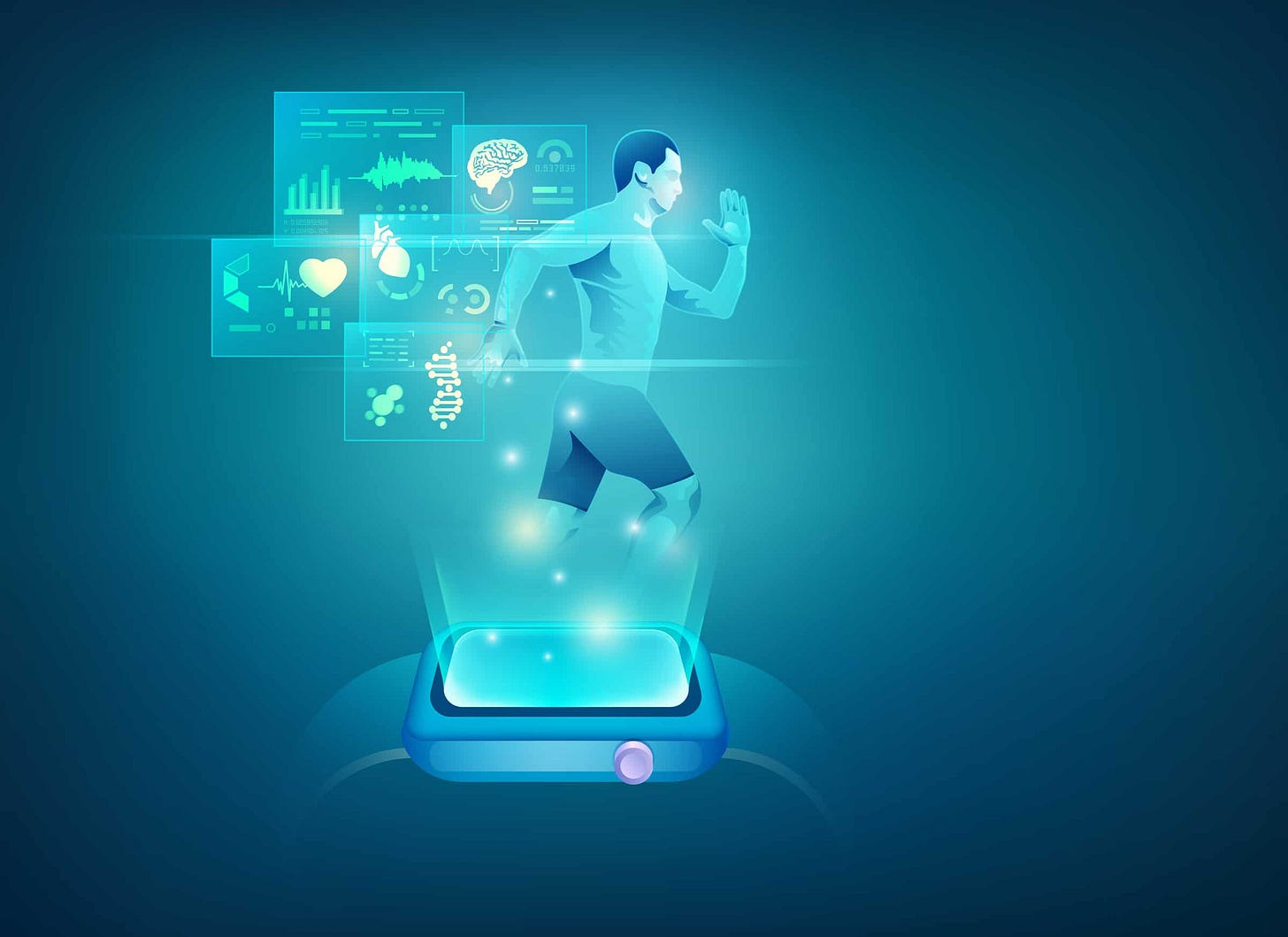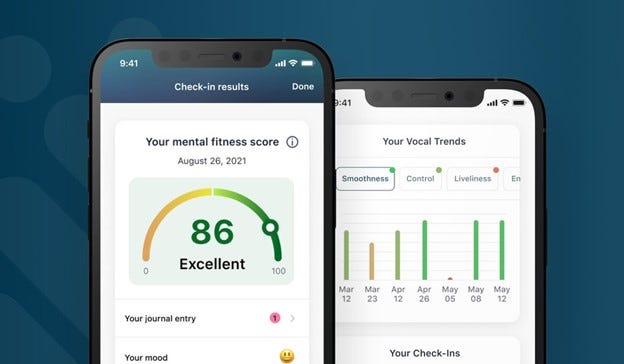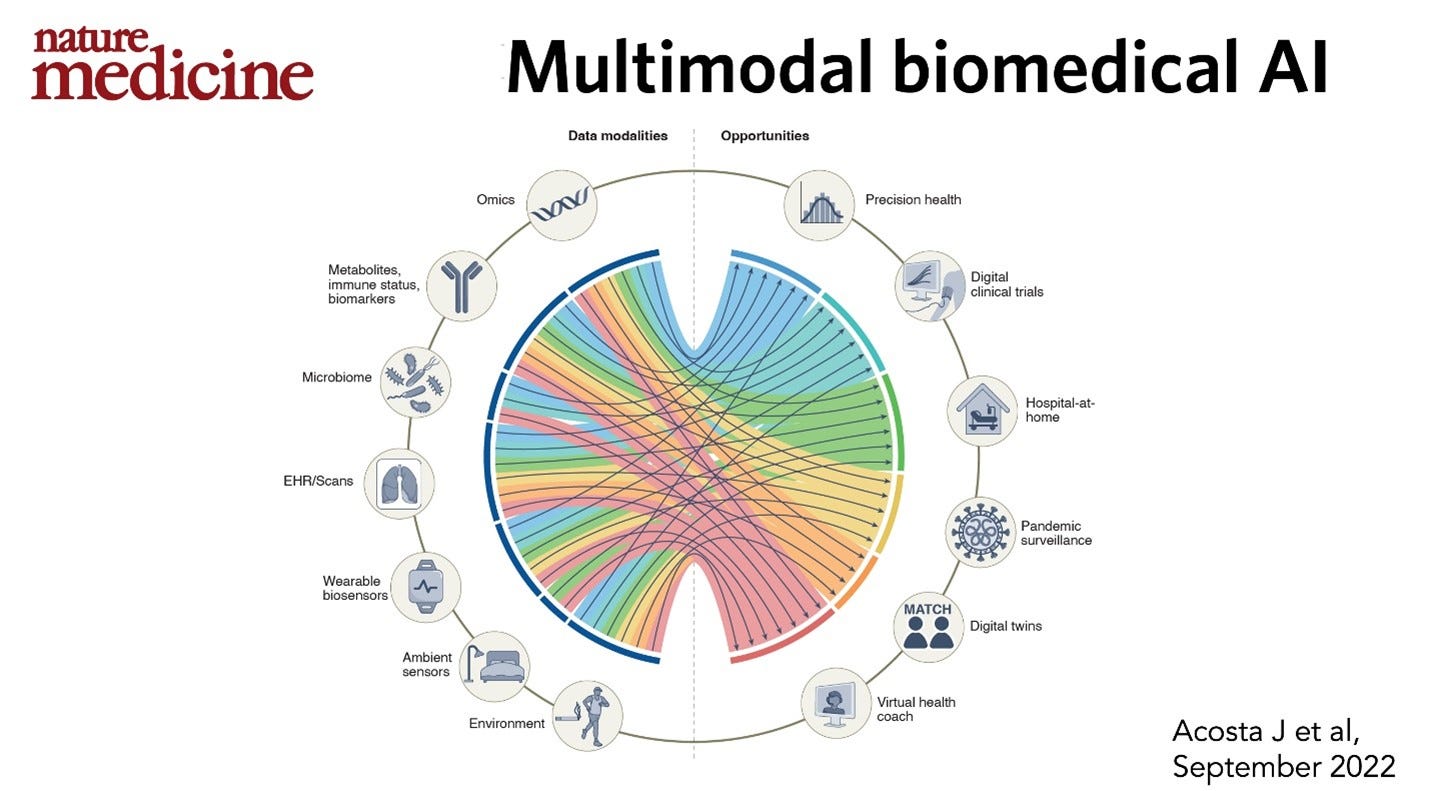How AI and Digital Biomarkers are Transforming Health
Welcome to this week’s edition of Vitamin Z, a newsletter about health and wellness with 3,000+ subscribers. If you are new, you can join here.
In this issue:
Pro athletes using wearables to optimize performance
New ways to track health: Voice, physical activity, sleep, gait
Virtual health assistants and the future of AI in healthcare
I listened to an interview with the trainer for star quarterback Patrick Mahomes. He revealed one secret to the Super Bowl champion’s success: A good night’s sleep.
Mahomes has used the Whoop band to track his sleep since 2020 (he’s also an investor in the company). According to his trainer, Mahomes has not lost a single game when he’s woken up with a good sleep score.
Today, digital health tools are making it easier to track sleep, physical activity, and respiration. These measures are known as digital biomarkers.
Soon these tools will be able to extract health signals from your gait, movement patterns, smart phone use—even your voice.
From my work with the world’s leading healthcare companies, I’ve gotten a glimpse into the future of this technology and its impact on health. Here’s what I’ve learned—and what I’m most excited about.
What are Digital Biomarkers?
Traditional biomarkers—cholesterol levels, blood pressure, body temperature—are an important part of medical research and practice. They’re measured and evaluated as an indicator of normal biological processes, pathogenic processes, or pharmacologic responses to a therapeutic intervention.
What are the drawbacks of traditional biomarkers? They can be invasive and expensive (blood tests, cerebrospinal fluid tests). Traditional biomarkers only offer a snapshot view of a patient’s health status, as they can collect a limited number of measurements over time.
Digital biomarkers are different. They:
Are generated by the patient or consumer, via connected digital tools
Track various physiological and behavioral parameters
Can be collected passively and continuously to monitor some aspect of health or disease management
The Future of Wearable Devices
Think about Fitbit, Apple Watch, Oura Ring. Millions use these wearable devices to track their physical activity, heart rate, and sleep.
The next generation of wearable devices will be:
Clinical grade, meaning they measure physiological signals with high accuracy and reliability
Multivariate, i.e. able to track several different aspects of health
Connected to a person’s electronic health record, allowing for real-time, personalized health feedback and coaching
I’ve been working with a startup that’s developing a smart watch for early detection of cognitive decline and neurodegenerative disease (Alzheimer's, Parkinson’s).
The smart watch tracks your health across multiple dimensions—cognitive function, physical activity, sleep—and uses AI to predict signs of deterioration. So you can get ahead of any health issues before they get more serious.
Voice, Gait, and Activity Tracking
Digital biomarkers can be classified by:
The type of data they capture
The diseases or health conditions for which they have predictive value
I made a list to illustrate some of their uses:
Voice
What can we learn about someone’s health by listening to them speak?
AI-based voice analysis can derive digital biomarkers of cognitive functioning in trauma survivors, mood disorders like anxiety and depression, and even respiratory illness and cancer.
These systems are trained on large databases of audio clips to detect speech differentiators (i.e., tone, inflection, pacing, etc.); quality of the voice; as well as breathing patterns and airway issues, such as the presence of a cough.
Several startups are developing speech tests / voice analysis technology:
Winterlight has developed a tablet-based technology that assesses cognitive health (including memory, thinking, and reasoning) by analyzing short snippets of speech. The system is being studied for its use in detecting cognitive impairment associated with dementia and mental illness.
Sonde Health uses audio signal processing and machine learning to sense and analyze subtle vocal changes due to changes in a person’s physiology to provide insights into health and well-being.
Gait
New technologies are able to extract health information via gait analysis—studying the way a person walks and moves around.
A company called Linus Health provides iPad-based brain health assessments. In 2022 the company acquired Kinesis Health Technologies, which has developed wearable sensors to assess the physical capabilities of patients. The combination of gait analysis tools and digital brain health monitoring technologies is designed to spot Alzheimer’s and mild cognitive impairment.
Multimodal AI health solutions
Healthcare leaders believe data generated from wearable and ambient biosensors could enable the development of multimodal artificial intelligence solutions.
These systems will be powered by data captured from digital technology, including heart rate, sleep, physical activity, electrocardiography, oxygen saturation and glucose monitoring.
Personalized medicine has been called “the holy grail.” Digital biomarkers will be combined with biomedical data, electronic health records, and genome and microbiome sequencing to capture the complexity of human health and disease.
Virtual Health Assistants
Today, virtual health coaches are helping people manage diabetes, migraine, and asthma.
With the next generation of AI, we could have virtual health assistants to help people manage a wider spectrum of health conditions.
The virtual assistants would leverage individualized profiles—based on genome sequencing, continuous monitoring of blood biomarkers and metabolites, biosensors and other relevant biomedical data—to promote behavior change, answer health-related questions, or communicate with healthcare providers when appropriate.
Virtual health coaches could replace the physician as your first point of contact with the healthcare system. The virtual coach would monitor your condition in real-time and alert a doctor or nurse when it detects a problem that requires human intervention.
The Promise of AI in Healthcare
Technology isn’t going to replace doctors. Some parts of healthcare will always be better in person. A nurse’s touch, tone of voice, empathy—the human element plays a crucial role in people’s recovery from illness. A doctor’s physical exam can detect things machines can’t.
Yet healthcare needs technology innovation to meet its growing challenges. Half the US is diabetic or pre-diabetic. Over a third suffer from depression or anxiety.
Technology is the only way we can scale healthcare to treat our growing challenges and provide the best care to those in need.
People are more engaged with their health when they’re able to check it on their phone or smart watch. When health isn’t gated behind the walls of a doctor’s office.
The more we can take what doctors and nurses do, and migrate that into hardware and software, the better we’ll be able to deliver healthcare to the entire planet.
As always, I’d love to hear your thoughts. What do you like (or not like) about wearables and digital health technology? Where do you see the greatest opportunities?
Thank you for reading this week’s edition of Vitamin Z.
Until next time,
By Daniel Zahler
Hi there and thanks for reading. If you stumble on my newsletter, you will notice that I write about health and wellness, and ways to optimize cognitive, physical and emotional health. I work with the world’s leading healthcare and life sciences companies to develop innovative new solutions to improve health globally. I was trained as a research scientist at Harvard, and I serve as a GLG council member where I advise global business leaders on healthcare and technology innovation.
Enjoyed your reading experience?
Follow me on Twitter.
Hit reply with your feedback and ideas :)
Share this post with others.









